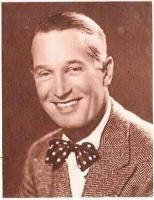 Maurice Auguste Chevalier .
Maurice Auguste Chevalier .
Data e luogo di nascita: 12 Settembre 1888, Ménilmontant, Parigi, Francia
Data e luogo di morte: 1 Gennaio 1972, Parigi, Francia
Esordì nel 1901 in piccoli cafés-concerts e divenne ben presto il rappresentante più autorevole, con Mistinguett, del varietà degli anni Venti. Iniziatore di un genere garbato, eccelse nelle canzoni "recitate" ( Valentine, Un clochard m'a dit , Mômes de mon quartier , Mimi , Paris je t'aime). Recitò con successo in teatro e soprattutto nel cinema, dove fece la sua prima apparizione nel 1911, nelle comiche di Max Linder. E. Lubitsch lo diresse in film brillanti dal 1930 al 1934: Il principe consorte, L'allegro tenente , La vedova allegra , girati a Hollywood. Con Il silenzio è d'oro (1947) di René Clair diede il meglio della sua recitazione. Di un secondo periodo americano va ricordato il musical Gigi (1958). Ha pubblicato Ma route et mes chansons, 6 volumi (Parigi, 1946-54) di notizie su quarant'anni di varietà. Si ritirò dalle scene nel 1968.
http://www.mymovies.it/dizionario/Bibl...
*
Maurice Chevalier (September 12, 1888 January 1, 1972) was a French actor and popular entertainer. He was born in Paris, France in 1888 and made his name as a star of musical comedy, appearing in public as a singer and dancer at an early age.
It was in 1901 that he first began in show business at the age of 13. He was singing at a cafe for free when a well-known member of the theatre saw him and suggested that he try out for a local musical. He did so, and got the part.
In 1909 he became the partner of the biggest female star in France at the time, Mistinguett at the Folies Bergére; they would eventually play out a very public romance.
During World War I, he entered the armed services, was shot in the back, won the Croix de Guerre and became a prisoner of war.
After the war Chevalier became popular in Britain, and began a film career. He also made his first attempt at a career on Broadway, but he had to give up performing for several months because of a mental breakdown. By 1929 he had recovered and moved to Hollywood, where he landed his first American film role in Innocents of Paris. In 1930, Chevalier was nominated for the Academy Award for Best Actor, for two roles: The Love Parade and The Big Pond.
He returned to France in 1935, and spent most of World War II in seclusion, though he made brief appearances, on one occasion as part of a prisoner exchange. After the war it was alleged that he had been a collaborator with the Vichy regime, though these claims were disputed and he was formally acquitted.
By the 1950s and 1960s, he rediscovered his popularity with new audiences, appearing in the movie musical, Gigi (1958) with Leslie Caron and Hermione Gingold, with whom he shared the song "I Remember It Well", and several Walt Disney films.
Chevalier's signature songs included "Louise", "Mimi", and "Valentine." His trademark was a casual straw hat, which he always wore on stage with his tuxedo. Although thought of as a suave, Continental ladies' man, Chevalier was gay [1]. To avoid suspicions that would have hurt his career, he passed off his live-in lover as a servant. Chevalier has a star on the Hollywood Walk of Fame at 1651 Vine Street.
The Marx Brothers used Chevalier's image in a famous sequence from the film Monkey Business. They stole his passport and each brother impersonated Chevalier, complete with boater hat, to get off a boat they had stowed away on. Each brother sang "If A Nightingale Could Sing Like You" in his own manner, with Harpo Marx using a record player on his back for his version.
Maurice Chevalier died on January 1, 1972 aged 83, and was interred in the cemetery of Marnes la Coquette in Hauts-de-Seine, France.
Maurice Chevalier's trademark laugh is transcribed as "Onh-onh-onh".
http://en.wikipedia.org/wiki/Maurice_C...